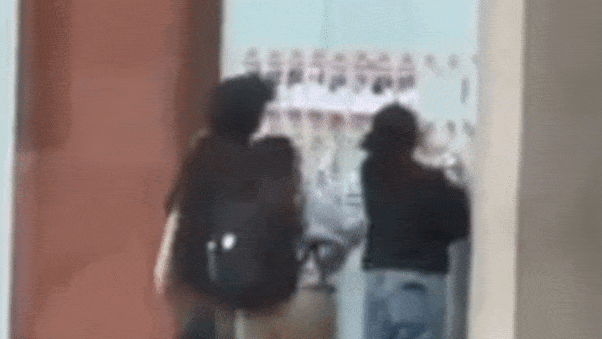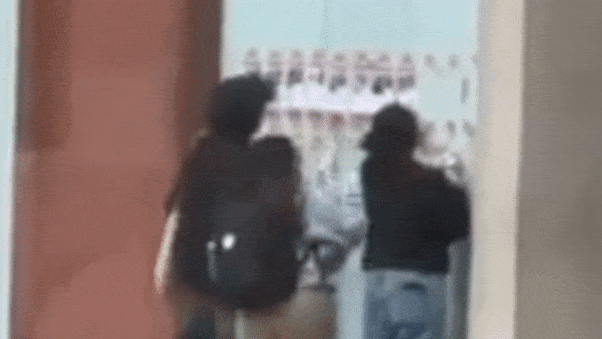Yazmeen Deyhimi, who the organization Stop Antisemitism identified as one of two New York University students caught on video tearing down flyers depicting the faces of people Hamas kidnapped to the Gaza Strip, began volunteering for the Anti-Defamation League when she was just a freshman in high school. While still a young teen, she “took part in the ADL Peer Training Program,” according to a short biography of Deyhimi included in the ADL of New York and New Jersey’s announcement of its 2019 high school summer intern class. “She quickly joined the No Place for Hate Committee and has been committed to help facilitate events such as Unity and Equality Days,” the blurb continued.
The then-high school junior was a Girl Scout, as well as a tennis instructor for the underprivileged. “She is,” we learn, “extremely passionate about fighting racial profiling and championing gender equality.”
The ADL could not have been expected to know that a bright and socially conscious high school student from the extremist hotbed of Port Washington, New York, would proudly announce a sociopathic lack of sympathy for Jews in terrorist captivity four years later. At the same time, Deyhimi’s story is a look into how little sticking power the ADL’s brand of consensus-seeking, center-left politics might have in the long run, even with people who volunteered with the group through most of high school. “We fully condemn her actions and hope that the apology she issued is the first step towards working to repair the harm and deep hurt her actions caused,” an ADL spokesman told Tablet by email when asked about Deyhimi.
“As a matter of policy, ADL does not comment on personnel matters,” the ADL spokesman wrote. “However, we will say that ADL and our staff are steadfast in our support of Israel, that our body of work speaks for itself, and that we are grateful for the tireless efforts of the entire ADL team in the wake of the largest mass murder of the Jewish people since the Holocaust.”
Deyhimi’s apology, which came after she was widely identified by name on social media, opened with the acknowledgement that “My actions that were caught on camera are a poor representation of what I believe: all innocent lives—Israeli and Palestinian—should be spared and all terrorist organizations should be condemned and punished.” The sentiment is blameless, of course. Who could argue otherwise?
In her apology, the NYU junior proved herself to be a fluent writer of officialese, proof her education at a hyperselective American college did not go to waste. What do young high-achievers learn at expensive universities these days—aside from, perhaps, the necessity of supporting terror attacks against Israeli families, children, and old people, of course—if not the language of virtuous self-presentation, a survival skill in a world in which one might flip from being a victim to victimizer in a hot minute? Handling these kinds of passages is a delicate art, worthy of the courtiers of Versailles.
As the NYU junior continued, “I have found it increasingly difficult to take my place as a biracial brown woman, especially during these highly volatile times. I find myself more and more frustrated about the time we currently find ourselves in.”
The honesty is laudable, and it is hard not to identify with it, whatever your beliefs about the war: Everyone is at least a little frustrated right now. People want to repair a horrific breach in reality, wherever they are and however they can, even if their real motive isn’t to improve much of anything in the external world but to quiet their own inner turmoil. All the better if one’s emotional pain-relief racks up the maximum number of points on the great peer group-social, media-victimhood scoreboard.
While tearing down flyers of kidnapped Jews isn’t most people’s idea of helping the situation, or seems a strange way of assuaging an individual sense of helplessness, the thought process Deyhimi describes in her apology is chillingly legible, common to people of good and ill intent on both sides of this awful conflict. We all want to do something, don’t we? But do what? Hard to say, now that “reality” is an increasingly vague chaos in which our own ever-multiplying “identities” can seem like the last pillars of certainty.
People want to repair a horrific breach in reality, wherever they are and however they can, even if their real motive isn’t to improve much of anything in the external world but to quiet their own inner turmoil.
Deyhimi’s trajectory tracks with that of a generation of rising elites for whom staid, establishment institutions have served as a pipeline to a much edgier, more militant set of values, which themselves are admission tickets to prestige institutions. Thirty student groups at Harvard, including, initially, the university’s Amnesty International chapter, signed on to a statement endorsing Hamas’ slaughter of 1,400 Israelis—many of them believing, no doubt, that a public display of fealty to a terror group wouldn’t hurt them in the elite job market.
After all, no one suffered for endorsing demonstrations by BLM members at which multiple police officers were murdered; or by embracing the violent riots that followed the death of George Floyd; or the nightly firebombing of a Portland courthouse by antifa members; or antifa violence more generally. Fanonist principles are regularly endorsed in dozens of classes, along with attacks on the “colonial mindset” and “white supremacy.” How could a young up-and-comer at a place like NYU or Harvard go wrong by endorsing the anti-colonial struggle of Palestinian freedom fighters?
In this particular crisis, however, the students guessed wrong about the grown-ups. Suddenly, and perhaps even unfairly, the rules have changed. The president of NYU’s student bar association had a job offer at the white-shoe firm of Winston and Strawn rescinded after she spoke up for Hamas’ right to resist Israel’s alleged occupation of Gaza by whatever means it chose. She expected, in this case wrongly, that holding doctrinaire Fanonist beliefs would be consistent with working one of the least-radical jobs one can possibly imagine, namely that of a corporate lawyer. Davis Polk, another behemoth of the straight-laced legal world, has also withdrawn job offers for Harvard and Columbia law students over their public backing of Hamas.
Many skilled and experienced lifelong operators within elite spaces appear to have perceived no contradiction between enjoying the benefits of the current system of status distribution while also acting in ways that are boldly disconnected from any previous, widely accepted system of morality. But maybe things are changing.
Young careerists at expensive universities should probably think twice before committing to support terrorist groups like Hamas—or to oppose them for that matter. The near-universal silence of university presidents, not to mention DEI officers, about the massacre of Jews suggests that the old new math continues to prevail on campus. One shudders at the consequences if an NYU student were caught tearing down posters in favor of Black Lives Matter, or flyers commemorating the victims of homophobia or police violence; their academic futures would already have vaporized. They might even get accused of having perpetrated a bias incident.
Meanwhile, it is unclear what kind of discipline Deyhimi will face for her actions. Perhaps the school will treat the flyer tear-down as a rash emotional reflex triggered in the intensity of the moment, extending a sense of nuance and understanding that isn’t typically applied to incidents of this kind in 2023.
When reached by email, NYU spokesperson John Beckman declined to say whether NYU was treating the flyer tear-downs as a hate incident. “We take the matter seriously, and we’re looking into it,” Beckman told Tablet.

